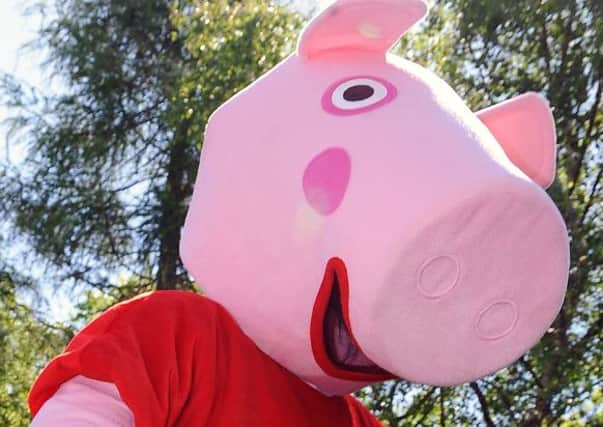Jane Bradley: Name and shame for animated aliases


For this week, an Italian woman has taken legal action against the British makers of cartoon Peppa Pig, claiming that their decision to give a character the same name as her – albeit in the English translation – has caused her significant distress.
Her name? Gabriella Capra, which, when translated, does indeed mean Gabriella Goat, one of Peppa’s friends on the pre-school show.
Advertisement
Hide AdAdvertisement
Hide AdShe is demanding €100,000 in compensation for the pain this coincidence has caused her, claiming to suffer taunts from friends and colleagues.
Ms Goat isn’t even a main character; she is apparently merely the daughter of the Pig family’s holiday home manager and niece of the local pizza maker, Uncle Goat. I wouldn’t even have heard of her myself. My daughter is still young enough to believe that “we don’t have Peppa Pig on our TV”.
The late Mr Duck, on the other hand, lived his life in the shadow of the US cartoon legend, but didn’t seem at all offended by this.
“I have been asked once or twice why I did not change my name, but I have had so much fun with it,” said the Mallaig GP in an interview in 2005.
He certainly did not court publicity, having only once before, in the 1940s, been interviewed in depth about his connection with the Disney icon – by a London-based radio station – comments which were never even used. Ms Goat (sorry, Capra), on the other hand, seems keen for her apparently traumatic association to be broadcast around the world.
More importantly, who goes around translating their name into other languages? Actually, I can answer that question.
When I was a teacher at a summer school in Eastern Europe many years ago, a nine-year-old boy introduced himself to me on the first day as “Michael Camp” – the name he wrote on every piece of work he handed me over the next month. I didn’t think it sounded like a particularly likely local name in any respect but gave it little consideration. At the end of the course, I was handed a pile of certificates to give out to the children by their class teacher. I was surprised to find there was not one for Michael, one of the best students in the class. There was, however, one for a child called Mihai Tabara.
CONNECT WITH THE SCOTSMAN
• Subscribe to our daily newsletter (requires registration) and get the latest news, sport and business headlines delivered to your inbox every morning
Advertisement
Hide AdAdvertisement
Hide Ad“Who is Mihai Tabara?” I asked. “Me,” replied Michael. “I thought as it was an English course, I should translate my name into English. Tabara means camp – like a campsite.”
He’s now a software engineer in Silicon Valley. Smart boy.
But it is not just individuals whose names can cause trouble.
In the United States, a restaurant chain called Illegal Pete’s has been petitioned to change its name, as migrant groups there feel its association with the term “illegals” to be demeaning.
The owner is bemused. He named the chain after his father, who had somewhat of a reputation for a rebellious streak. He employs a lot of immigrants, he says. He had no intention of offending anyone and doesn’t see why he should change the name of a brand he has spent years building.
It seems, however, that he is going to have to: town meetings have been held, at which he has been faced with sobbing first-generation families saying the business’s title is causing them, like Italy’s Ms Capra, a great deal of emotional distress.
There has also been a flurry of companies rushing to change their name from Isis, a moniker for the Islamist militant group responsible for the murders of a number of foreign hostages.
In Canada, an immigrant support service called the Immigration Settlement and Integration Services has decided to ditch its current title due to the unfortunate association.
Even more bizarrely, a near-hundred-year-old Belgian chocolate maker, also called Isis, has recently opted to do the same, switching to the owner’s surname of Libeert. The reason? It says it has been inundated with calls from customers saying they no longer want to buy its products. Presumably in case the dinner party guests of Antwerp think their hosts are operating subliminal recruiting tactics when serving up the truffles.
Advertisement
Hide AdAdvertisement
Hide AdWhatever is in a name, it seems that, in some cases, another rose would indeed smell as sweet. Sometimes a lot sweeter.
SCOTSMAN TABLET AND IPHONE APPS